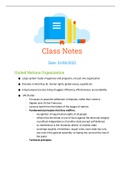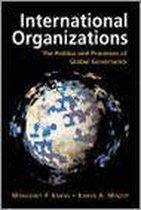Class Notes
Date: 31/08/2022
United Nations Organization
● Large system made of agencies and programs, not just one organization
● Diversity in what they do: human rights, global issues, equality etc.
● A big bureaucracy also bring struggles: Efficiency, effectiveness, accountability
● UN Charter:
- Focusses on peaceful settlement of disputes, rather than violence
- Signed June 26 San Francisco
- Lessons learnt from the failure of the league of nations
- Fundamental principles that they reaffirm;
- recognition of equal human rights of all people
- refrain from the threat or use of force against the territorial integrity
or political independence of another state (except self defense)
- no interference in the ‘domestic affairs’ of another state
- sovereign equality of members. (equal votes, each state has only
one vote in the general assembly, no taking into account the size of
the state)
- Technical principles:
, 2
- Pact sunt servanda in 2022: if you sign a treaty, you have to go into
it in good faith and stick to it. Latin for promises must be kept.
- The UN Charter also established the Security Council as vigil of
peace and security. It authorizes the security council for use of
force (blue helmets), legitimized use of force (irony)
- Payment of annual contributions by Member States
● General assembly:
- General debate arena of the world.
- All the states have equal representation in this assembly in New York.
- Meets once a year starting in September in NY for three months, serves
also as a general meeting platform, often with many heads of states
attending.
- Competencies and tasks:
- Resolutions aimed at individual members states, non-members,
security council or other organs, Secretary- General, the General
Assembly itself
- UN organization and budget
- Admitting states to UN membership
- Electing non-permanent members to the SC and ECOSOC
-
- Appointing judges to international court of justice
- Appointing UN SG upon recommendation of SC
- Can make studies with regard to conflicts
- Charter amendments with ⅔ majority and approval of P5. Total of
193 members (asia 50 seats, africa 55, europe 42, Latin America
33, North America 2, Oceania 11)
- Only two sovereign states, not members: Taiwan and Kosovo. Newest
member is Sudan.
- General assembly contains six functional committees.
- Regional groups are important for selecting candidates for positions in the
UN organs and system
- Most decision-making is done by consensus, acclamation or non-
objection with formal vote
, 3
- Agenda setting institution for world politics, little actual decision power
(hard to make decisions about huge global issues with so many people)
- After end of cold war, shift of importance from General Assembly toward
Security Council , Secretary General and economic institutions such as
WorldBank, IMF, WorldTradeOrganization
● Secretariat
- Headed by secretary- general, housed in NY and partly Geneva
- SG has a 5 year renewable term
- Prepares UN budget, submits annual reports to GA
- Functions: Mediator in conflicts, advocate, campaigner for bringing issues
to light
- Agenda setting (what international conflict should be focussed on),
spokesperson (talking to the press), research
- To bring moral authority to the table in global issues.
- Is the SG doing enough with the Ukraine issue?
- SG is seen as an agent of powerful states
- Reflect on the stature and level of power of SG
-
- Staff are independent employees representing the international
community serving the organization as a whole.
- Legitimacy based on expertise, moral purpose and neutrality
- Staff or international civil servants selected on basis of technocratic
expertise (background in economic, social and peace operations)
- implementation of economic, social, humanitarian programs and peace
operations
- Gathering statistical data, preparing studies and reports
● Security council
- Composition of 5 permanent countries (US, Russia, China, UK, France),
and 10 rotating countries, non- permanent members who get elected for
two-year terms by the General Assembly (with and end of term date)
-
, 4
- Primary responsibility for maintenance of international peace and security
- With what crisis is the UNSC currently concerned?
- Authority to act on behalf of all member of the UN
- Small number of member to maintain efficient and effective decision
making
- Decisions with approval or non-objection of Permanent 5 and 4 of 10 non-
permanent members
- Meets on particular questions brought to its attention, including thematic
meetings on broader issues for peace and security like AIDS
- If any of the big 5 VETO against issues, the decision will not be passed
-
- After end of Cold War, much more active role, peacekeeping operations
(currently 6), economic sanctions
- Since then, more transparency and increased consultation, also with non-
members of SC, Secretariat and non-state actors
- UK and Syria: demonstrates the SC’s impotence, if great powers have
opposing interests
- Various examples: Sri Lanka, Somalia, Rwanda, Yugoslavia, Libya, Syria)
show the difficulty of dealing with domestic peace and security
- Council depends on voluntary cooperation of UN Member States (troops,
resources etc)
● Economic and Social Council (ECOSOC)
- Un’s central forum for addressing international and social issues (incl.
Human rights)
- Oversight over 70% of UN’s financial and human resources
- Coordination of specialized agencies like ILO, WHO, FAO, WB, IMF
- Statistics, research, conferences
- Un liaison for NGOs
- 54 members, including the permanent 5, Germany and Japan
-
- Geographical distribution of specialized agencies makes coordination
difficult and decreases efficiency and effectiveness
- Eight functional commissions like social development, narcotics, status of
women, statistics, population and development





